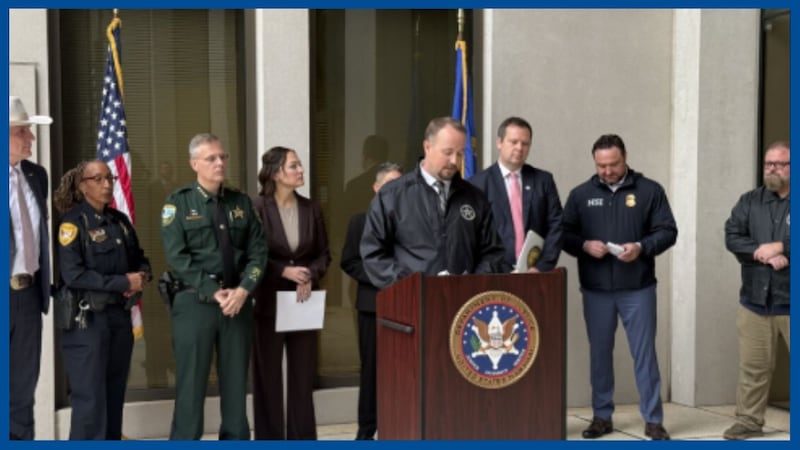OSCEOLA COUNTY, Fla. — During the next legislative session, some Florida lawmakers plan to tackle ways to reduce the number of non-violent offenders crowding the state’s prison system.
Florida TaxWatch told Channel 9's Len Kiese that it believes a change in policies could save taxpayers at least $50 million a year and reduce sentences for inmates not considered a risk.
An Osceola County man is currently fighting a drug sentence he and his family believe is too harsh for the crime. Under Florida’s mandatory minimum laws, John Horner was sentenced to 25 years in prison.
"They didn't even let him say goodbye,” said his daughter, Raven Griffin.
It’s time that ticks away slowly for Griffin, who calls herself a “daddy’s girl.”
"The concept of 25 years just wasn't real,” she said, “My dad always told us, "You know, wait a year, I'll be out, I'm going to fight this. I'm going to be out. A year went by, two years went by."
It was 2012 when the husband and father was found guilty of trafficking hydrocodone, which is a felony.
Under Florida law at the time, it was punishable by a mandatory minimum 25 years in prison. Horner has been fighting to be released ever since.
"And it's heartbreaking to know that that's probably not going to happen, and it's unfair,” said Griffin in tears.
Griffin called it unfair because she said her father is a first-time drug offender. The pain pills he was found guilty of trafficking were his own pills that he thought he was selling to a friend in need.
Horner has a glass eye, which he received a legal prescription for pain pills. Court records showed that friend turned out to be an informant who was working with Osceola County vice agents to reduce his own potential prison time.
"25 years for giving who he thought was a friend in pain at the time, pain pills. 25 years for that?” Griffin asked.
In all, it’s believed Horner sold about $1,800 worth of pills to the informant. After his arrest and eventual sentencing, he was sent to Liberty Correctional Institution where his current release date is set for August 2036.
“It really does take a toll,” said Greg Newburn with Families Against Mandatory Minimums
FAMM works to bring about fair sentences on the federal and state levels.
"Hundreds of offenders are still in Florida prisons when they probably don't need to be,” said Newburn.
Newburn said the problem is mandatory minimum sentences for drug offenses don’t always have the intended effect.
"You pass a mandatory minimum for what you think are drug kingpins, Pablo Escobar-types pushing mountains of heroin and cocaine through the country. Instead, you get very low-level couriers, you get street-level dealers and you get addicts who are selling to continue their own addiction,” Newburn said.
Newburn said the end result is broken families and homes.
"So you never get the high-level guys. You end up getting thousands of very low-level people and it never makes a dent in the drug trade."
Recognizing the punishments were too harsh for some, Florida lawmakers overwhelmingly agreed to make some changes in 2014. The weight threshold was upped for oxycodone and hydrocodone and some penalties were reduced.
"Before, it was just a handful of pills would yield three years in prison. Now it takes more than that,” said Newburn.
Newburn said he’s pleased with the progress in the state. He’s still pushing more so-called safety valves to be put in place to give judges more freedom in sentencing and to prevent “one size fits all” punishments. Unfortunately for Horner, the changes are too late.
"If Mr. Horner were convicted of the same crime today, he would receive a mandatory sentence of 7 years, each one of those offenses, but the judge could make it concurrent,” said Newburn.
As things stand now, Horner will be 72 years old before he’s released.
"Unfortunately, the only way he can get out is executive clemency or commutation from the clemency board,” said Newburn.
"To not only bring my dad home, but to also reform these ridiculously lengthy laws,” said Griffin.
Griffin hopes her daughter gets to somehow meet her grandfather as a free man. For now, she said she can only imagine how that would be.
"Just amazing…” she said.
Horner does have a prior record in Georgia, but court records WFTV found showed it placed no bearing on his mandatory minimum sentencing for drug offenses; legal experts said the same.
In filed appeals, Horner argued he was tricked into selling his prescription pills and his acceptance of a plea agreement was unintelligently made.
Related stories:
- Man recently released from prison arrested at UCF
- Man who shot at George Zimmerman sentenced to 20 years
- 9 Investigates Florida's prison guard staffign crisis
Cox Media Group




